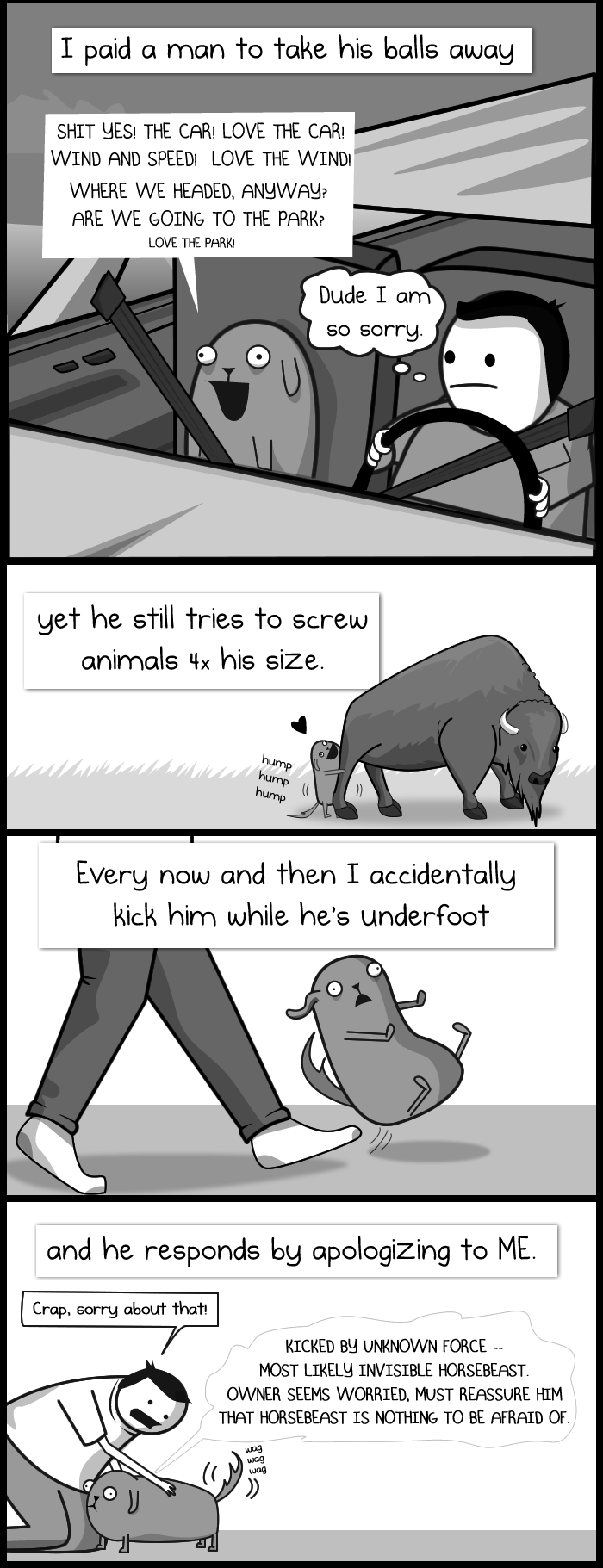This issue has been addressed beautifully in My Dog: The Paradox – The Oatmeal (final panel):

This raises the interesting question of whether dogs always realise that you did the stepping—let alone whether it was intentional.
This issue has been addressed beautifully in My Dog: The Paradox – The Oatmeal (final panel):

This raises the interesting question of whether dogs always realise that you did the stepping—let alone whether it was intentional.
There was use of Greek script to write Turkish: Karamanli Turkish. Illustrated in https://www.quora.com/How-has-it…

But without some concerted linguistic work, Greek script was not much better suited to Turkish than Arabic script was. No differentiation between <ı> and <u> for example: both ου. No systematic differentiation of <c> and <ç>, just as Greek (at the time) did not differentiate /ts/ and /dz/: both τζ. No smooth way of rendering <ö> and <ü>. No differentiation of <ş> and <s>.
Now these were not insurmountable difficulties. The Soviet orthography for Pontic (now reborn on the Pontic Wikipedia) dealt with similar issues by inventive use of digraph, and by ignoring any backward compatibility with metropolitan Greek.
But why bother when
There was also the small issue of who the Turkish War of Independence was fought against…
I referred to my wrong answer in Nick Nicholas’ answer to What is it like to be able to fluently speak Klingon?. The oddity is also commented on in Pedro Alvarez’s answer to What English word is pronounced the most differently from the way it is spelled?
Here’s the deal, from the appendix to Vox Graeca
Greek had a diphthong ει. It was a diphthong in Homeric Greek, /ei/, but by Attic it was /eː/, and had merged with what was in Homeric Greek /e.e/, εε. By Roman times, it was pretty much /i/, and it is transliterated into Latin as <i>. So Εἰρήνη Irene, εἰδύλλιον idyll, συμπάθεια sympathia > sympathy.
Because most Greek loans came into English via Latin—or were spelled as if they did—we rarely get a Greek word in English spelled with an <ei>.
But there are exceptions. Such as deixis and seismic.
So. How to pronounce those?
If you pronounced ει in your Greek like Modern Greek, or even like the Romans did, you would be pronouncing it as an /i/. It would end up [sɪzmɪk, dɪksɪs].
That’s not what happened. Greek was being taught in England with Erasmian pronunciation: an attempt to approach the original pronunciation. Because Greek spelling is conservative, that would end up as a diphthong. And the diphthong that ει looks like (and indeed was in Homeric times) was /ei/.
That’s fine. English has an /ei/ diphthong, so that won’t be a problem. We can just tell people to say δεῖξις as in “day-xis”, σεισμικός as in “say-smi-koss”.
So what happened?
Well what happened is that the [eɪ] pronunciation of long a in English is recent. Like, 18th century recent. Which is why in Scots long a still has its older pronunciation of /eː/.
So if you’re teaching Ancient Greek in England in the 17th century, you have a problem. You know that ει sounds like [eɪ], but if you’re teaching it in 17th century English, there is no English sound corresponding to [eɪ]! Certainly not long a.
So they did the next best thing. (For some bizarre notion of “next best”.) They picked the nearest diphthong available in the English of the time.
They picked long i.
And when English did pick up the [eɪ] sound, it was too late. The teaching of Greek in England was stuck on [aɪ] as the pronunciation of ει. And when Greek words were borrowed afresh into English, with the <ei> spelling, they took the 17th century teaching pronunciation with them. σεισμικός was taught as [saismikos], so seismic was pronounced as [saɪzmɪk].
Language. You can’t make this shit up.
Uncontroversially: from the Greek εις την Πόλιν [is tim polin], “to the City”—The City being the informal name of Constantinople in Greek, to this day. There is at least one similar Turkish placename: İstanköy is the Turkish for Kos (εις την Κω /is tin ko/).
There are some uncertainties about why it ended up as İstanbul instead of İstinbul. In fact there’s a paper I stumbled on in academia.edu, quoting me to support a Tsakonian origin for the /a/. (Impossible, the Tsakonians wouldn’t have shown up next to Erdek until 1700, and we’re talking two villages. But it’s nice to be quoted.)
An Islamic nation, no; but bits of it have been majority Muslim, including Crete (9th century, and again 17th century); and the bits that weren’t majority Muslim were substantial minority Muslim in Ottoman times.
Sometimes, I ask for clarification in comments. Much more rarely, I’ll answer after the clarification. (Questions aren’t the asker’s, they’re the community’s. They aren’t mine either.)
Sometimes—more often than some, possibly: I answer anyway. On occasional, I even answer a question related to the question answered.
Hey, ask a broad question, get all sorts of answers.
νόστιμος, /nostimos/.
The etymology (yes, that’s what I do) is odd. The primary meaning of nostos, the word that nostimos is derived from, is “return”: it’s the word for Odysseus’ return to Ithaca.
Wheat gives a rich return on investment, so nostos also means the yield of ground grain. Hence the adjective means “abundant”, referring to foodstuff; and from there, “wholesome, succulent, nutritious” by Roman times.
As Liddell–Scott tells you.
What my betters have said, with both the pros and cons from Don Grushkin’s answer.
Be aware of the following constraints:
Don’t let this talk you out of it. At all. Just be aware—even more so than anyone considering a career in linguistics in general. Be prepared for some disillusionment.
And from what I gather from those I know that have stuck with it: be prepared for some life-changing, life-long friendships too.
Without getting into the issue of how much of Genesis is historical and how much is wishful thinking:
The Babylonian captivity, which can be independently verified from archaeology, was 580 to 530 BC. That’s when the Hebrew Scriptures as we know them were consolidated.
Omri is the first independently verified King of Israel, and he was around 880 BC.
Our first historical evidence of the Greeks is in Linear B, which goes up to 1200 BC; but the era of the Ancient Greeks as we know them starts with Greek writing, around 770 BC. Any Greek you’ve heard of by name, other than Homer, is 7th century BC or later.
So the era of the ancient Greeks starts two to three centuries after David (if there was a David), and a lot longer than that after the Flood (if there was a Flood).
I wrote a series of articles on my blog about my visit to Montreal in 2009: Montreal VI: Joual 4, Nicholas 1 .
My French is crap. I tried to blend in by wearing a Deutschland football cap and speaking in French. But I hear one subordinate clause, and I no longer know what my own name is.
And that’s not counting Joual.
This was the last of my French encounters in Montreal:
The woman checking me for my flight in is a Mme Trudeau. Given my Trudaeuolatry, this is all the more reason to try in French.
Mme TRUDEAU: Bonjourhello.
NICK: (Um, am I really going to do this?…) Bonjour.
Mme TRUDEAU: (French) Where are you travelling today?
NICK: (French) Melbourne. With the transiting to L.A.
Mme TRUDEAU. So… you are flying to New Orleans?
NICK: No, the Los Angelès.
Mme TRUDEAU. Ah. One piece of luggage?
NICK: Yah.
(Mme Trudeau spends a couple of minutes investigating my ticketting situation, and has a quick exchange with a colleague in English.)
Mme TRUDEAU: [Pushes my ticket to me and huddles towards me—the way people in service industries do, when they need to explain something complicated to you, that will involve at least one subordinate clause.]
Mme TRUDEAU: (French) Right. Montréal Quebæc Gatsinoo Sharbrouc Trwè Riviàres Sænt-Djan-sur-Richelioo. Sænt-Hyacænthe Jolietts’ Rouÿn-Noranda. Salaberry-de-Valleyfield Alma Val-d’-Or Sænt-Djorges Baie-Comoo. Septz-Îles Riviàre-du-Loup Amos. Matæne La Tsuque Dolboo Lachuts’.
NICK: …
I was dumbstruck. Her lips were moving, but I could not understand a solitary syllable of any of it.
Mme TRUDEAU: (English) … It’s better in English?
Right. Think of something suitably apologetic and humble to say.
NICK: (English) I’m sorry, I haven’t learnt joual.
… That may not have been it.